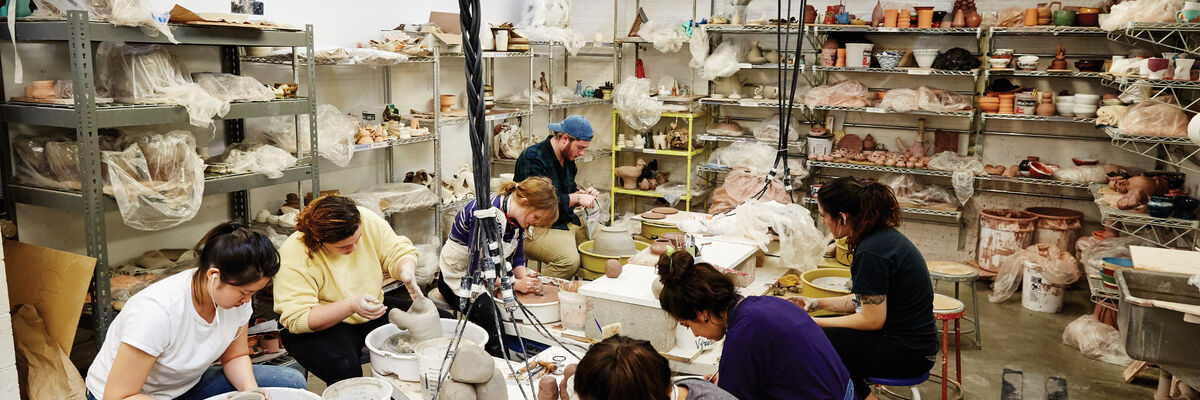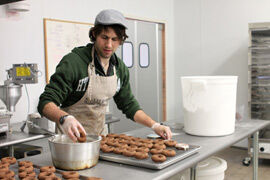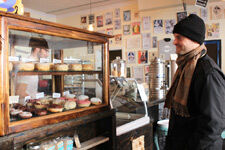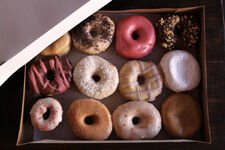
Food for Thought

Scroll down for Dan Dunbar’s recipe for vegan banana bread with chocolate chips.
Walking into the Dun-Well Doughnuts shop in Brooklyn is like walking into another era. From the vintage photographs hanging salon-style on the wall to the 1920s costumes and personas put on by the shop’s two owners, Christopher Hollowell and SAIC alum Dan Dunbar (BFA 2009), the place has a friendly, old-time doughnut shop feel. Just three months after opening their shop in December 2011, the New York Daily News named Dun-Well’s artisanal creations the best doughnuts in New York City.
But behind the scenes, Dunbar and Hollowell are making business and artistic decisions they hope will get patrons to think about their food choices. Although there is no signage in the shop saying so, all of Dun-Well’s doughnuts are vegan, and the owners take great pains to research their suppliers and ingredients to ensure their choices are ethical and compassionate to both humans and animals.
“I really have the same approach with artmaking that I do with doughnut making,” Dunbar says. “It feels very subversive. This is all just a big art experience. I’m getting people to think about things without realizing it. I’m not necessarily telling them what to think, but trying to get them thinking about something in a different way.”

This approach stems from his days as an art student at Ithaca College, where he first met Hollowell. Dunbar became known by his peers for his passion for animal rights and activism.
“I was so connected to the art I was making, and people were critiquing it not on what they saw, but what they know about me,” he says. After he finished his Bachelor of Arts, he applied for a Bachelor of Fine Arts at SAIC to further develop his work.
Determined not to be categorized again, Dunbar purposely closed himself off from his peers, hoping his work would be judged on its own merit. He concentrated his studies in the Sculpture department and credits SAIC faculty member Stephen Reber with helping to spark a breakthrough. Dunbar’s art had a strong purpose, but he was having trouble finding a way to talk about abuses on industrial farms and pollution while also talking about food people eat. It was difficult to get his audience thinking about these things in a positive way.
“Stephen understood the conflict I was having. It was conversations with him that got me thinking that art didn’t have to be in a gallery—that there were other things I could do. I started getting into performance,” Dunbar says.
To illustrate this point, Dunbar describes a piece in which he made a paper-mâché cow head and mounted it to the front of a shopping cart. He recorded his performance as he pushed the cart through a supermarket, filling it up with meat along the way.
“In this situation, it was just odd," he says. "And people reacted to it in different ways. At one point, I left the cart, and people thought it was a sale rack.”
One woman saw him watching it and asked if he was responsible; he said he was. “This is great,” she replied. But people who saw the film later had a completely different reaction. Their minds were not as open to the piece because they were prepared to have an art experience.

“I feel like that project is like what I do at the doughnut shop,” Dunbar says. “People are eating the doughnut but they’re not prepared to experience it as a vegan product, so their guard is down. Behind the scenes, it’s all social activism. But in the shop, it’s the 1920s feel.”
Dunbar and Hollowell’s brand of activism means ethical sourcing. One of their cooking oils contains palm oil, and palm oil plantations have caused catastrophic deforestation in Indonesia, which is wiping out the natural habitat of orangutans and great apes. Through research, they found a fair trade palm oil from Columbia where there are no great apes or orangutans. Impact on the environment and treatment of workers are the guiding principles behind their choices. Running their business this way takes a lot of extra work.
Developing the recipe alone took almost a year and was complicated by the fact that that Dunbar couldn’t eat other doughnuts while coming up with his vegan version. In fact, the lack of a decent vegan doughnut is how the business idea came about in the first place. Hollowell, who was living in New York at the time, was watching an episode of the Simpsons featuring Homer’s love of doughnuts. It sparked an unsuccessful search for a vegan doughnut. He called Dunbar, who was in Chicago. The two had always planned to start a business together, and they agreed that this was it.
Dunbar had never made a doughnut before and calls his first attempt, “probably one of the biggest failures in baking of all time.“ But he didn’t give up. He bought a small fryer from Target and began making test batches in his apartment and offering them to friends for feedback. Even after he moved to New York and opened the shop, Dunbar kept experimenting.
“We really push the boundaries with what you can do with a doughnut,” he says.
Dun-Well’s customers may not even realize that New York City’s best doughnuts—which come in more than 200 flavors, including pink lemonade, French toast, and raspberry pistachio, as well as classic glazed or cinnamon sugar—are organic, vegan, and fair trade. It seems that for Dunbar, the payoff comes when unsuspecting customers suddenly discover the doughnuts they are eating are actually works of art with a message.
“I wanted a shop that makes a larger populace think about their food choices,” he says. “When you do learn about where everything is coming from and what goes into it, you learn a lot about your food choices. I feel much healthier now. My goal is getting people more connected to their food choices—not telling them what they should be eating, but getting them to think about it.”
Dan Dunbar’s Recipe for Vegan Banana Bread with Chocolate chips:
Ingredients:
2 cups all-purpose flour
3/4 cups white granulated sugar (I prefer unrefined cane sugar)
1/2 cup dark brown sugar, packed
3/4 t. baking soda
3/4 t. salt
3/4 t. cinnamon
1/2 cup plain soy milk or almond milk
1 t. apple cider vinegar
2 cups mashed banana, from about 4 large very ripe bananas
1/4 cup canola oil
2 T. maple syrup
1 t. vanilla extract
1 Cup semi-sweet chocolate chips (dairy-free)
Prep:
1. Preheat the oven to 350 F. Lightly oil a 9"x5" loaf pan and set aside.
2. In a medium-sized mixing bowl, sift together the flour, sugars, baking soda, salt and cinnamon.
3. In a large mixing bowl, whisk together the soy milk and cider vinegar and let stand for a couple minutes. Add the mashed banana, canola oil, maple syrup, and vanilla extract, and whisk until well combined. Add the dry ingredients to the wet, mixing until just combined (do not overmix!). Fold in the chocolate chips and pour the batter into the prepared loaf pan. Bake for about 1 hour, or until a toothpick inserted into the center emerges clean. Allow the bread to cool on a wire cooling rack for 20 minutes before serving. Serve warm or at room temperature.
